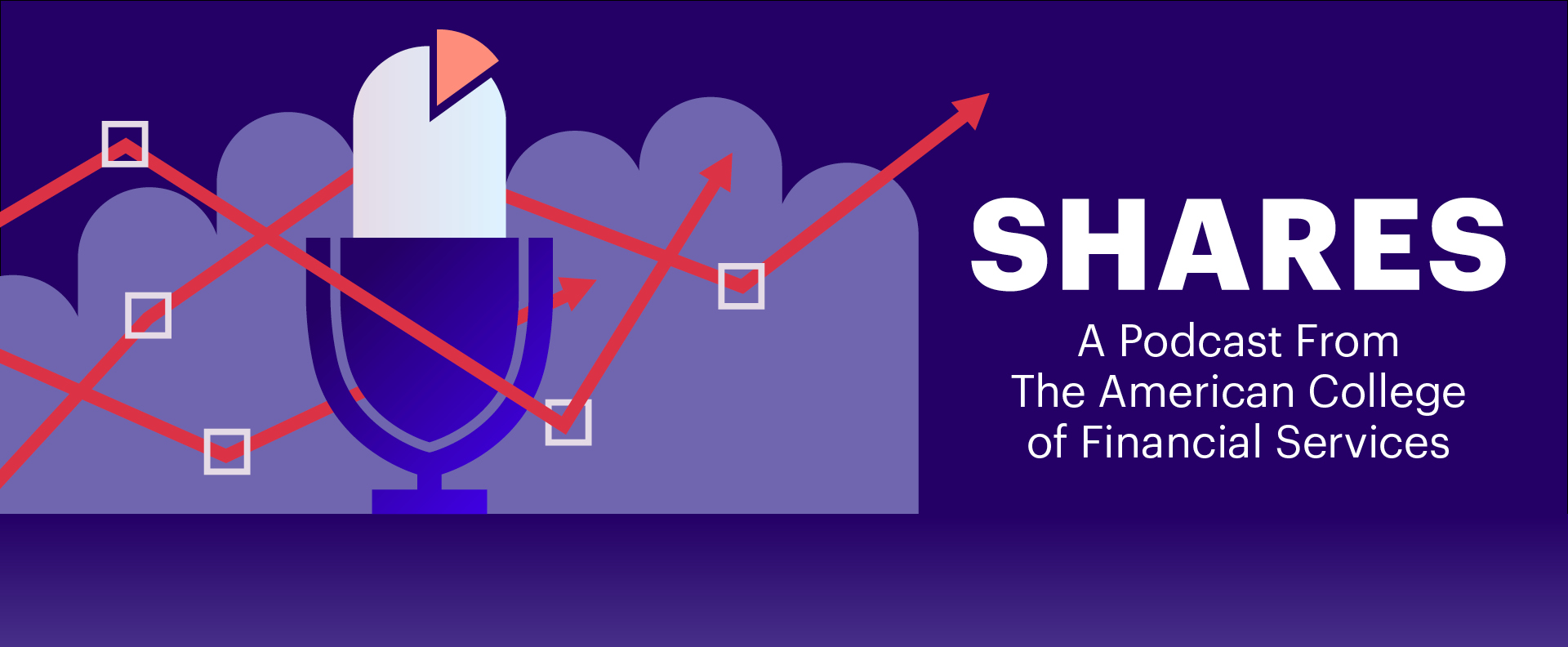Author
Subscribe to Newsletter
Related Posts
Key Insights for Informed Retirement Decisions
Author
Eric LudwigSubscribe to Newsletter
Related Posts
Financial Services Firms of the Future
View DetailsMolding the Next Generation of Financial Services
View DetailsRetirement Planning Podcasts
Shares: Actualizing a Dream

In this episode of our Shares podcast, host Eric Ludwig, PhD, CFP® is joined by his own martial arts instructor, small business owner, and actor Mike Moh – perhaps best known for his turn as legendary actor and martial artist Bruce Lee in Quentin Tarantino’s 2019 film Once Upon a Time in Hollywood. Moh details the challenges and triumphs of pursuing his acting goals and building a business based on community, as well as what financial professionals can take away from his journey to apply to their own career endeavors.
Mike Moh is an actor and the founder of LVLUP Martial Arts in Waunakee, WI. Mike grew up in St. Paul, MN. He was inspired by one of his heroes, Jackie Chan, while working as a stuntman in Hong Kong on the film “Robin-B-Hood” to pursue a career in acting. He relocated to Los Angeles and landed roles in numerous commercials, TV shows, and films like
“Street Fighter: Assassin's Fist,” widely considered the best film adaptation of a video game. After nearly a decade in LA, he relocated his family back to the Midwest in 2013 to open his own martial arts studio while still booking roles on prime-time shows like FOX's “Empire” and ABC's “Marvel's Inhumans.” Moh continues his martial arts training daily and holds the rank of 6th Degree Black Belt in Songahm Taekwondo. In November 2022, he was bestowed the title of Master Instructor.
Any views or opinions expressed in this podcast are the hosts’ and guests' own and do not necessarily represent those of The American College of Financial Services.
Author
Subscribe to Newsletter
Related Posts
WEBCAST: AdviceTech & AI - Beyond Fiduciary Duty
Author
Subscribe to Newsletter
Related Posts
Financial Services Firms of the Future
View DetailsMolding the Next Generation of Financial Services
View DetailsAbout The College News
College News Roundup Week of March 25 2024
Financial Advisor | Building And Leading Gender-Diverse Teams
March 27, 2024
Lindsey Lewis, CFP®, ChFC®, director and chair of the American College Center for Women in Financial Services, joins Kaylee Ranck, PhD, The College’s director of research, in writing about the importance of gender diversity on teams in the financial services industry and beyond in recognition of Women’s History Month.
Social Security Matters | Breaking Barriers: Celebrating Women’s Vital Roles as Disability Advocates
March 29, 2024
Joellen Meckley, JD, MHS, ChSNC®, executive director of the American College Center for Special Needs and the Center for Women in Financial Services, writes on the government’s Social Security Administration blog the benefits available to assist both those with special needs and their caregivers – many of whom are women.
Author
Subscribe to Newsletter
Related Posts
WEBCAST: The Building Blocks of Belonging
Author
Subscribe to Newsletter
Related Posts
Financial Services Firms of the Future
View DetailsMolding the Next Generation of Financial Services
View DetailsRepresentation On-Demand Webcasts
The Building Blocks of Belonging
Author
Subscribe to Newsletter
Related Posts
WEBCAST: Three Reasons while the DOL Rule Could Force You to Become a Fiduciary
Author
Subscribe to Newsletter
Related Posts
Financial Services Firms of the Future
View DetailsMolding the Next Generation of Financial Services
View DetailsAbout The College News
College News Roundup Week of March 18 2024
Financial Advisor | Five Key Questions For Ensuring Responsible AI In Financial Services
March 22, 2024
Azish Filabi, JD, MA, executive director of the American College Center for Ethics in Financial Services, along with Neeraja Rasmussen of Spyglaz, explore how artificial intelligence (AI) is reshaping the financial services profession and potential ethical questions companies will need to address.
Author
Subscribe to Newsletter
Related Posts
Financial Services Firms of the Future
View DetailsMolding the Next Generation of Financial Services
View DetailsRepresentation Insights
Women Making History

Throughout the history of America, women have always had to fight for everything they had. It took 93 years for the first women to gain the right to vote in Wyoming. It took 192 years for the first woman to serve as a member of the Supreme Court. This country still has not seen a woman president, even 248 years after the Founding Fathers came together in Philadelphia to establish this country. Simply put, America has not always been the land of opportunity for women that it has for men.
Still, it is for this exact reason that society must appreciate the strong women that have dedicated their lives to breaking down barriers and paving the way for generations of women that follow in their footsteps. As such, The American College of Financial Services is proud to spotlight the life and accomplishments of Margaret I. Bradshaw, CLU® during this Women’s History Month. Bradshaw was the first female agent hired by the John Hancock Insurance Company in Providence, Rhode Island in the late 1920s. From there, she eventually became the first woman to earn her Chartered Life Underwriter® designation in 1931, a mere four years after the designation’s creation.
Leading the Way
This was the start of a successful and influential career for Bradshaw, who went on to found the Rhode Island Chapter of the Professional and Business Women's Association, serving as the association’s president1. She also established herself as an industry leader through her unwavering commitment to ethics throughout her lifetime until her passing in 2011 at age 106. Through the Margaret Bradshaw Lecture Series at The College and her numerous donations to the American College Center for Ethics in Financial Services, Bradshaw made it clear that the integrity of the profession was a top priority to her—a commitment she demonstrated on numerous occasions throughout her life with generous financial contributions to The College. Bradshaw sought to pass on her commitment to ethics in financial services by providing lectures and teaching courses at Brown University, demonstrating to younger generations of financial services professionals what it means to be a champion of ethics in the field.
At the President’s Dinner in November 2023, The College recognized Bradshaw by awarding her with a Huebner Gold Medal, the highest honor The College bestows to individuals who have proven their commitment to The College and its mission.
Closing the Gap
Bradshaw’s contributions are not limited to The College though. Thanks to the trailblazing of women like Bradshaw, the profession has become a far better place for women. As of 2021, 46.3% of all life insurance agents were women2, and 30.1% of all financial advisors were women3. Female life insurance agents also earn 91 cents for every $1 earned by men4, a significantly smaller wage gap than the overall American wage gap that sees women earn 82 cents for every $1 earned by men5.
It is important that these trends continue. Women are expected to inherit $30 trillion by the year 2030, representing the greatest transfer of wealth in history6. Any individual inheriting wealth should consider speaking with a financial advisor, but many people also prefer to speak with advisors that look like them or may share similar life experiences. It is for this reason that woman financial advisors will be critical to the tremendous wealth transfer taking place over the remainder of this decade.
Honoring the Legacy
In honor of Margaret Bradshaw and other trailblazers in the industry, The College continues her legacy by serving as an advocate for women in financial services as they become a larger presence in the field like never before. Through the American College Center of Women in Financial Services, the Women Working in WealthSM community, and support for women staff members, The College aims to be a champion for women in the same way Bradshaw was and continues to be, even 13 years after her passing.
And statistics would indicate progress is being made. As of November 2021, according to The College’s Diversity and Inclusion Triennial Survey, 51% of full-time staff were female, a near perfect representation of the United States population, which is 50.4% women according to the United States Census Bureau.7
Ultimately, it is the goal of The College to help shape the financial services industry to create a better future for all Americans. Through the efforts of women like Bradshaw, progress is being made toward these goals every day. So it is with great honor that The College uses this Women’s History Month to reflect on the life and legacy of Margaret Bradshaw and express a sincere hope that her works continue to grow.
Author
Subscribe to Newsletter
Related Posts